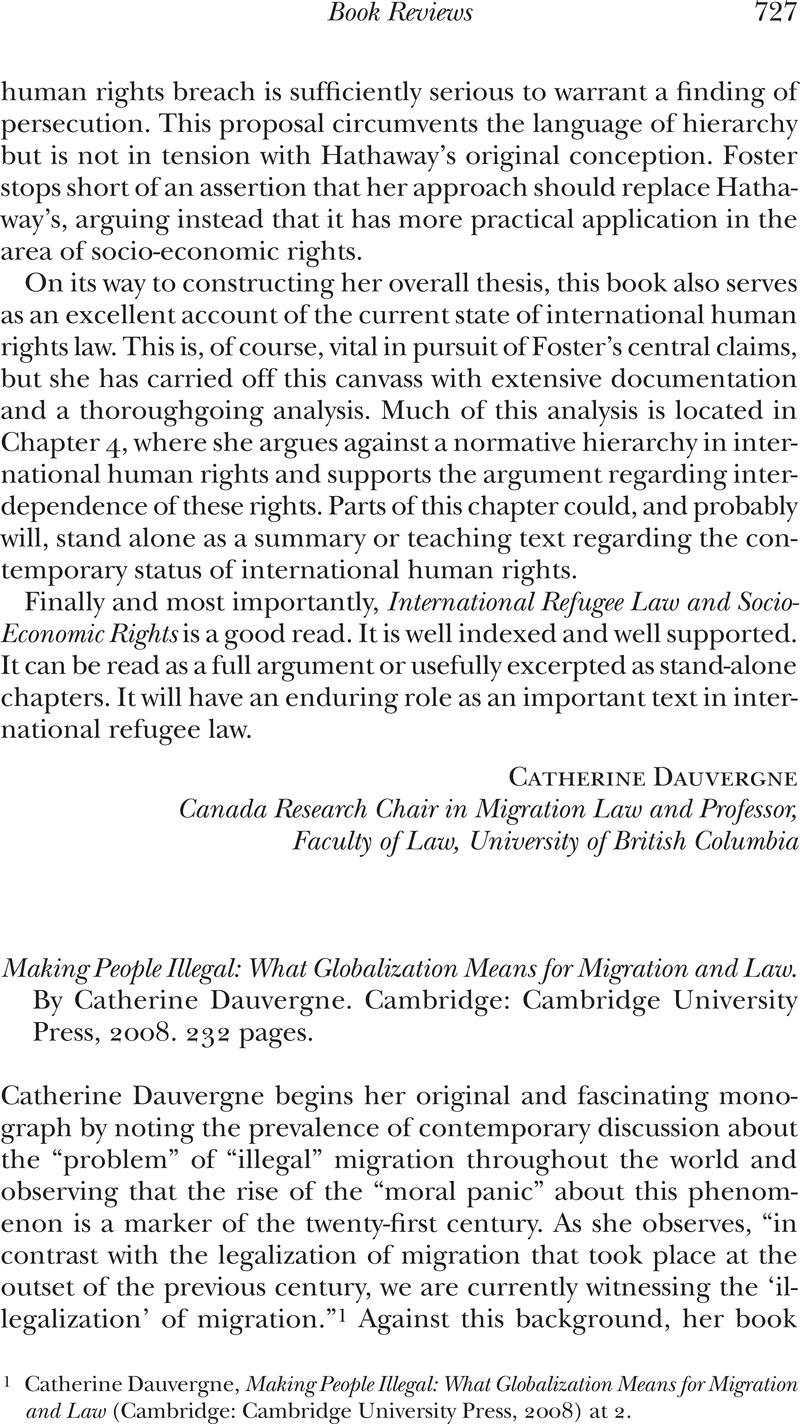No CrossRef data available.
Article contents
Making People Illegal: What Globalization Means for Migration and Law. By Catherine Dauvergne. Cambridge: Cambridge University Press, 2008. 232 pages.
Published online by Cambridge University Press: 09 March 2016
Abstract

- Type
- Book Reviews / Recensions de livres
- Information
- Canadian Yearbook of International Law/Annuaire canadien de droit international , Volume 46 , 2009 , pp. 727 - 735
- Copyright
- Copyright © The Canadian Council on International Law / Conseil Canadien de Droit International, representing the Board of Editors, Canadian Yearbook of International Law / Comité de Rédaction, Annuaire Canadien de Droit International 2009
References
1 Dauvergne, Catherine, MakingPeople Illegal: What Globalization Means for Migration and Law (Cambridge: Cambridge University Press, 2008) at 2.CrossRefGoogle Scholar
2 Ibid. at 2.
3 Ibid. at 8.
4 Ibid. at 3.
5 Ibid.
6 Ibid.
7 Ibid. at 27.
8 Ibid. at 21.
9 Ibid. at 22.
10 Ibid. at 31.
11 Ibid. at 29.
12 Ibid. at 33.
13 Ibid. at 35.
14 Ibid. at 37.
15 Ibid.
16 Ibid. at 38.
17 It should be noted that this has been discontinued on the election of a new federal Labor government. See “Last Refugees Leave Nauru,” Media release by the Minister for Immigration and Citizenship, 8 February 2008, <http://www.minister.immi.gov.au/media/media-releases/2008/ceo8014.htm>.
18 Dauvergne, supra note 1 at 55.
19 Ibid. at 68.
20 Ibid. at 92.
21 Ibid. at 117.
22 For a recent important decision in this area, see the decision of the European Court of Human Rights in A and Others v. United Kingdom, Application No. 3455/05, 19 February 2009 (affirming the decision of the House of Lords).
23 Dauvergne, supra note 1 at 107.
24 Ibid. at 184.
25 Ibid. at 56.
26 Ibid.
27 See generally Human Rights Committee, General Comment 15 on The Position of Aliens under the Covenant, Doc. A/41/40 (11 April 1986), 117 at paras 1, 2, and 4–10; and Committee on Economic, Social and Cultural Rights, Draft General Comment No. 20 on Non-Discrimination and Economic, Social and Cultural Rights, Doc. E/C.12/GC/20/CRP.2 (9 September 2oo8) at para. 26: “[A]ll Covenant rights apply to everyone including non-citizens and stateless persons.”
28 This is clearly evidenced in the context of the detention of “illegal” entrants, including asylum seekers. Since there is no international committee or treaty body to whom to complain of violations of the Refugee Convention, detained asylum seekers have resorted to lodging complaints before the Human Rights Committee under the ICCPR and have made out claims of arbitrary detention in this context in numerous cases. See, for example, A v. Australia (560/1993); C. v. Australia (900/1999); Bakhtiyari v. Australia (1069/2002), Baban v. Australia (1014/2001); and Shafiq v. Australia (1324/2004).
29 See Convention against Torture and Other Cruel, Inhuman or Degrading Treatment or Punishment, Article 3 (1); Human Rights Committee, General Comment 31 on Nature of the General Legal Obligation Imposed on States Parties to the Covenant, Doc. CCPR/C/21/Rev.1/Add.13 (26 May 2004), at para 12: “Moreover, the article 2 obligation requiring that States Parties respect and ensure the Covenant rights for all persons in their territory and all persons under their control entails an obligation not to extradite, deport, expel or otherwise remove a person from their territory, where there are substantial grounds for believing that there is a real risk of irreparable harm, such as that contemplated by articles 6 and 7 of the Covenant, either in the country to which removal is to be effected or in any country to which the person may subsequently be removed.”
30 For example, in Ammurv. France, [1996] 3 Eur. Ct. H.R. 827, the European Court of Human Rights found that France was in violation of the European Convention on Human Rights in depriving the applicants of their liberty when detaining them in the international zone of the Paris-Orly Airport (thus preventing them from making a refugee claim), even though France had deemed the airport to be part of an “international zone” and therefore outside French territory (and importantly, outside the reach of the European Convention).
31 See R. v. Immigration Officer at Prague Airport and another, ex parte European Roma Rights Centre and others, [2oo4] U.K.H.L. 55, where the House of Lords found that the United Kingdom government was in violation of the Race Relations Act in stationing its immigration officers in Prague Airport to prevent Roma persons from travelling to the United Kingdom to claim asylum. As Lady Baroness of Hale explained: “In this respect it was not only unlawful in domestic law but also contrary to our obligations under customary international law and under international treaties to which the United Kingdom is a party” (at para. 98).
32 Dauvergne, supra note 1 at 184. The European Court of Human Rights has repeatedly emphasized that “[c]ontracting States have the right, as a matter of well-established international law and subject to their treaty obligations including the Convention, to control the entry, residence and expulsion of aliens.” Chahal v. United Kingdom, Case 70/1995/576/662 (25 October 1996) at para 73. However, it has nonetheless held that the convention does impose restrictions on states’ ability to expel or deport “illegal” migrants based on the consequences of return, especially where Article 3 (prohibition against torture and inhuman and degrading treatment) is at stake.
33 Dauvergne, supra note 1 at 182.
34 R (ex parte Adan) v. Secretary of Statefor the Home Department, [2001] 2 A.C. 477; (2oo1) 2 W.L.R. 143 at 518 (H.L.).
35 Further, in Yogathas, concerns about efficiency could not be said to obviate the need for rigorous scrutiny of the legality of a transfer: R. (Yogathas) v. Secretary of State for the Home Department, [2003] 1 A.C. 920 (H.L.) at para 9.
36 R (Limbuela) v. Secretary of State for the Home Department, [2006] 1 A.C. 396 (H.L.).
37 Ibid. at para 13.
38 Ibid. at para 14.
39 Dauvergne, supra note 170.
40 Ibid.
41 Ibid. at 185.


